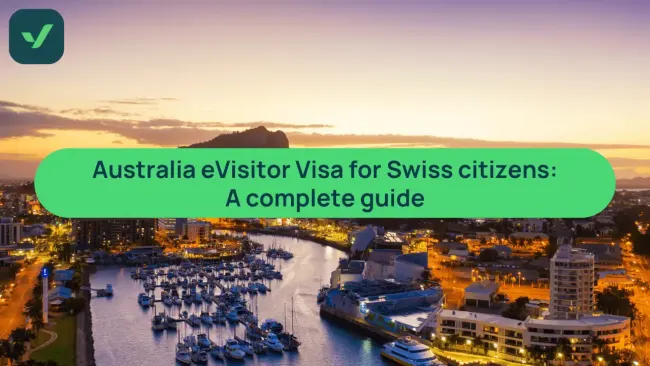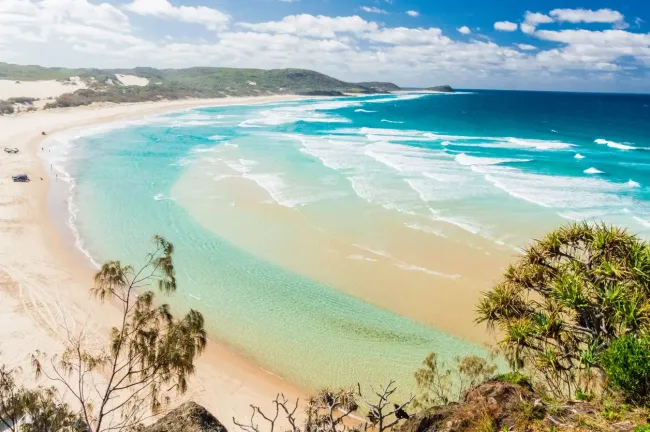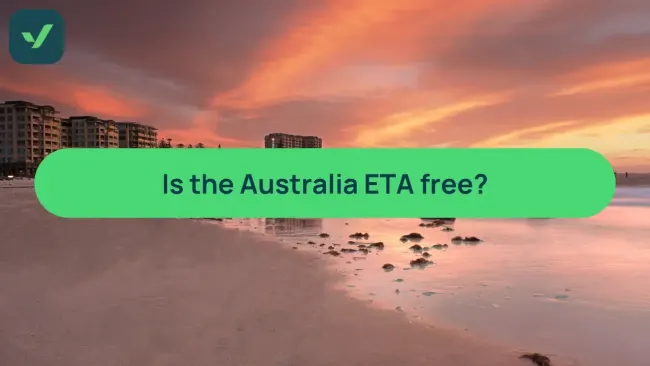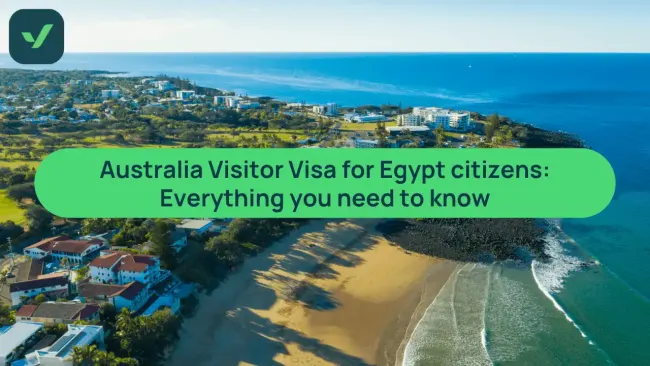
Australia
Welcome to Australia
New to the world of travel? Think of a visa as your golden ticket to explore new countries like Australia. Navigating visa requirements can often feel like deciphering a secret code. But here's the good news: We're pros at cracking that code!

What’s an Australia eVisitor Visa (Subclass 651), and who’s it for?
Who’s it for?
The Australia eVisitor Visa is designed for European passport holders from over 40 countries.
Who can’t apply?
-
Holders of non-citizen passports, certificates of identity, or other travel documents, including Titre de Voyage.
-
British National Overseas, British Dependent Territories Citizens, British Overseas Citizens, British Protected Persons, or British Subject passport holders.
Purpose?
-
For tourism activities such as sightseeing and visiting family.
-
Business activities like attending conferences or client meetings, but not for employment.
Duration of stay?
-
Multiple-entry visa valid for one year.
-
Allows stays up to three months per visit.
What’s an Australia ETA, and who’s it for?
The Australia ETA is a digital pre-screening for visitors from visa-exempt countries, granting preliminary travel approval.
Who's it for?
For passport holders from specific non-European countries like Brunei, Canada, Japan, South Korea, Singapore, the USA, and others. European passport holders should consider an eVisitor (subclass 651).
Purpose? Designed for short-term tourism or business visits.
Duration of stay
One-year validity with multiple entries. Stay duration is typically a maximum of 90 days per entry, varying by country.

Your gateway to adventure: experience the wonders of Australia with your visa.
What’s an Australia Visitor Visa, and who’s it for?
The Australia Visitor Visa (subclass 600) offers tailored options to match different travel needs, with specific criteria and conditions for each type.
Who’s it for?
-
Travelers from countries ineligible for eVisitor or ETA.
-
Suitable for long-term tourism, business, or family visits.
-
Required for travelers with criminal convictions or those traveling for healthcare reasons, ineligible for ETA or Visitor.
Purpose
Tourist: For vacations or visiting family. Requires proof of funds and sometimes an invitation letter.
Business: For work trips like meetings. Needs job details and financial proof.
Family-Sponsored: For family visits, with family acting as financial sponsors.
Also applicable for medical treatment visits.
Duration of stay
-
Options for up to 3, 6, or 12 months.
-
Suitable for extended stays and flexible travel plans.
What’s an Australia Student Visa, and who’s it for?
Who's it for?
Ideal for students pursuing education in Australia, from primary school to higher education.
Purpose?
The Student Visa is an official visa allowing foreign nationals to enter Australia primarily for educational activities, including language courses and vocational training.
Duration of stay
Can be valid for up to 5 years but depends on your enrollment.
At iVisa, we currently don’t offer the Australia Student Visa, but you can find out more on the Australia Government Website.
What’s an Australia Incoming Passenger Card, and who’s it for?
The Australia Incoming Passenger Card is a mandatory document for all travelers entering Australia, crucial for entry and customs clearance. It's part of Australia's biosecurity measures, which protect against harmful biological threats.
Who's it for?
-
All visitors entering Australia.
-
It's a single-entry document; a new card is required for each trip.
Note: Only citizens of Australia, New Zealand, Cocos (Keeling) Islands, Cook Islands, Christmas Island, Norfolk Island, Niue, and Tokelau can apply through us.
Purpose of the Incoming Passenger Card?
Collects traveler information, including identity, contact details, travel purpose, and declarations on quarantine and import-restricted goods.
Learn more about the Australia Incoming Passenger Card
GET YOUR AUSTRALIA INCOMING PASSENGER CARD TODAY
What are Australia’s Long-Term Visa options, and who are they for?
-
Skilled Independent Visa (Subclass 189): For skilled workers without sponsorship.
-
Skilled Nominated Visa (Subclass 190): For skilled workers nominated by a state or territory.
-
Employer Nomination Scheme (Subclass 186): For skilled workers sponsored by an Australian employer.
-
Business Innovation and Investment Visa (Subclass 188): For entrepreneurs and investors, leading to permanent residency.
-
Partner Visa (Subclasses 820 and 801): For partners of Australian citizens or residents.
-
Parent Visa (Subclass 103): For parents of Australian citizens or residents.
-
Distinguished Talent Visa (Subclass 858): For individuals with exceptional talent.
-
Global Talent Visa (Subclass 858): For highly skilled professionals in specific sectors.
If you’re still unsure of what type of visa you need, use our visa checker tool for more guidance. At iVisa, we're committed to turning your Australian dreams into reality, simplifying your visa journey at every step. Dive into our detailed pages linked above, and take the first step towards your Australian adventure today!
Staying healthy in Australia: Here’s what you need to know
Australia is known for its high health standards and well-established medical infrastructure. However, travelers must be informed about health-related requirements before visiting the country:
Make sure to stay updated on routine vaccines
-
Generally, Australia doesn't require mandatory vaccinations for most travelers. If you're arriving from a country considered at risk for yellow fever, you must provide proof of immunization.
-
Keep updated with Australia's COVID-19 requirements, such as quarantine, testing, or vaccine certificates, through your airline or the Australian government website
Medical facilities
Feel at ease knowing that Australia offers healthcare and medical facilities comparable to other developed nations. Whether public or private, hospitals have cutting-edge technologies and well-trained professionals.
Health Insurance
We recommend securing travel health insurance before your arrival. Australia has agreements with some countries for essential medical treatments, and insurance guarantees your protection against unforeseen expenses. It's peace of mind for your adventure.
Things to be aware of when traveling to Australia
Keep an extra eye on the following to keep healthy and safe:
-
Sun and Heat: Protect yourself with sunscreen, clothing, and sunglasses, and stay hydrated.
-
Water Safety: Swim between flags at patrolled beaches and be cautious of marine creatures.
-
Wildlife: Stay informed about potential threats and take precautions. Enjoy, but stay safe!
Medication for personal use
-
Declare All Medications: Always declare any restricted substances at customs. Undeclared items could lead to fines or legal action.
-
Original Packaging: Always keep medicines in their original containers.
-
Prescription or Doctor's Letter: Carry a valid prescription or a letter from your doctor explaining the need for each medication.
-
Check for Restrictions: Research beforehand to ensure your medications are allowed in Australia, as some substances are restricted or prohibited. Check the Australian Government's Therapeutic Goods Administration (TGA) for comprehensive information about drug control.
-
Quantity Matters: Bring only a reasonable quantity that aligns with the duration of your stay to avoid complications.
Quick overview: Essential documents for your Australian adventure
| Australia eVisitor | Australia ETA | Australia Incoming Passenger Card | Australia Visitor Visa | Australia Student Visa | |
|---|---|---|---|---|---|
| Valid Passport | ✓ | ✓ | ✓ | ✓ | ✓ |
| Travel Itinerary | ✓ | ✓ | x | ✓ | ✓ |
| Proof of Sufficient Funds | ✓ | ✓ | x | ✓ | ✓ |
| Return or Onward Ticket | ✓ | ✓ | x | ✓ | ✓ |
| Health and Character Requirements | ✓ | x | x | ✓ | ✓ |
| Biosecurity and Customs | ✓ | ✓ | x | ✓ | ✓ |
| Proof of Accommodation | ✓ | ✓ | x | ✓ | ✓ |
| Invitation Letter (if applicable) | x | x | x | x | ✓ |
| Confirmation of Enrollment (CoE) | x | x | x | x | ✓ |
| Overseas Student Health Cover (OSHC) | x | x | x | x | ✓ |
| Statement of Purpose (SOP) | x | x | x | x | ✓ |
If you’re still nervous about making silly mistakes, we’ve compiled a comprehensive guide to common reasons Australia Visa applications are rejected to avoid making these tiny mistakes.

 Australia ETA Online
Australia ETA Online
 United Kingdom ETA
United Kingdom ETA
 India Tourist eVisa
India Tourist eVisa
 Canada ETA Visa
Canada ETA Visa
 Turkey eVisa
Turkey eVisa
 Egypt eVisa
Egypt eVisa
 Singapore SG Arrival Card
Singapore SG Arrival Card
 Indonesia eVoa Visa
Indonesia eVoa Visa
 Aruba ED Card
Aruba ED Card


